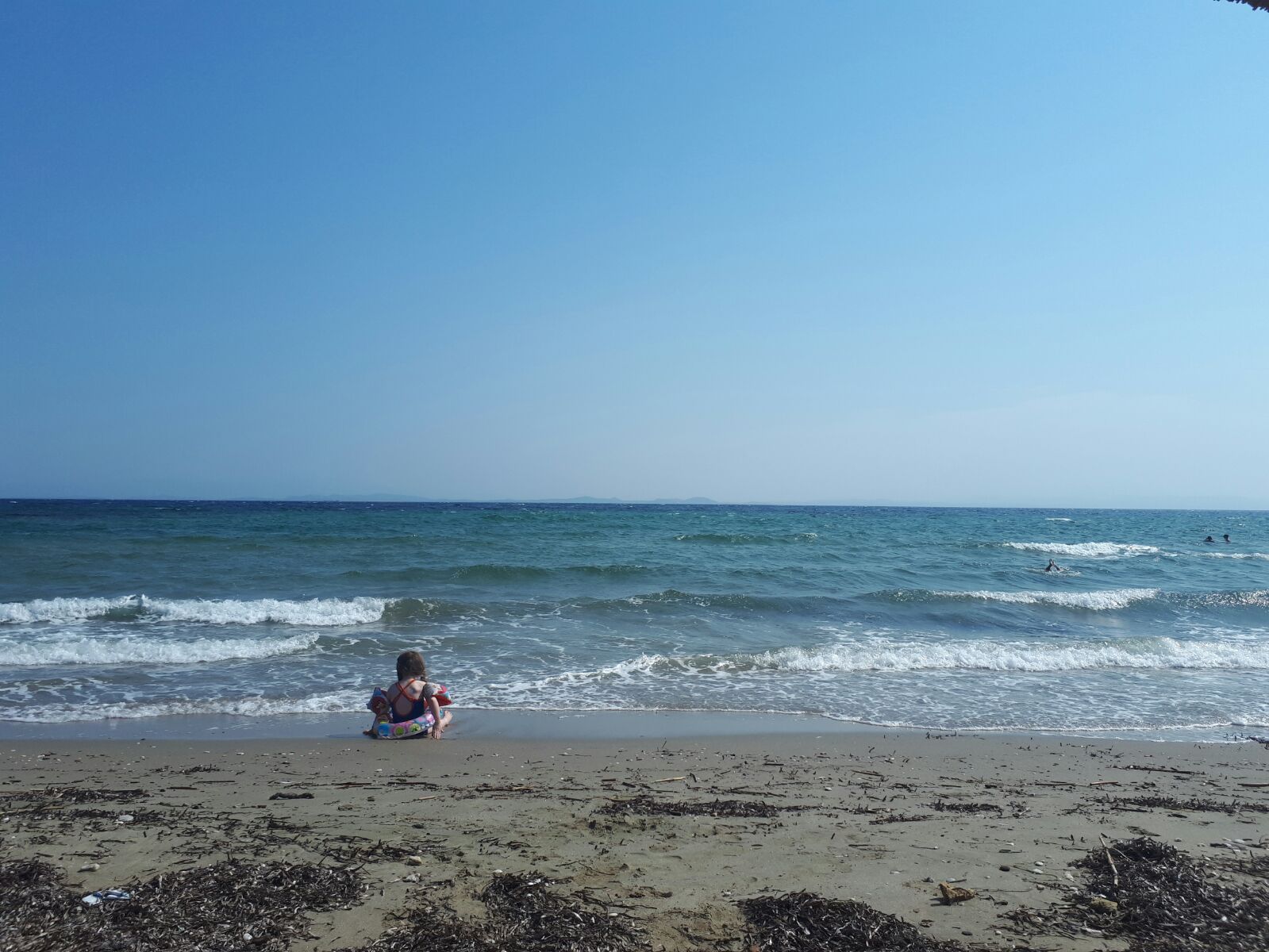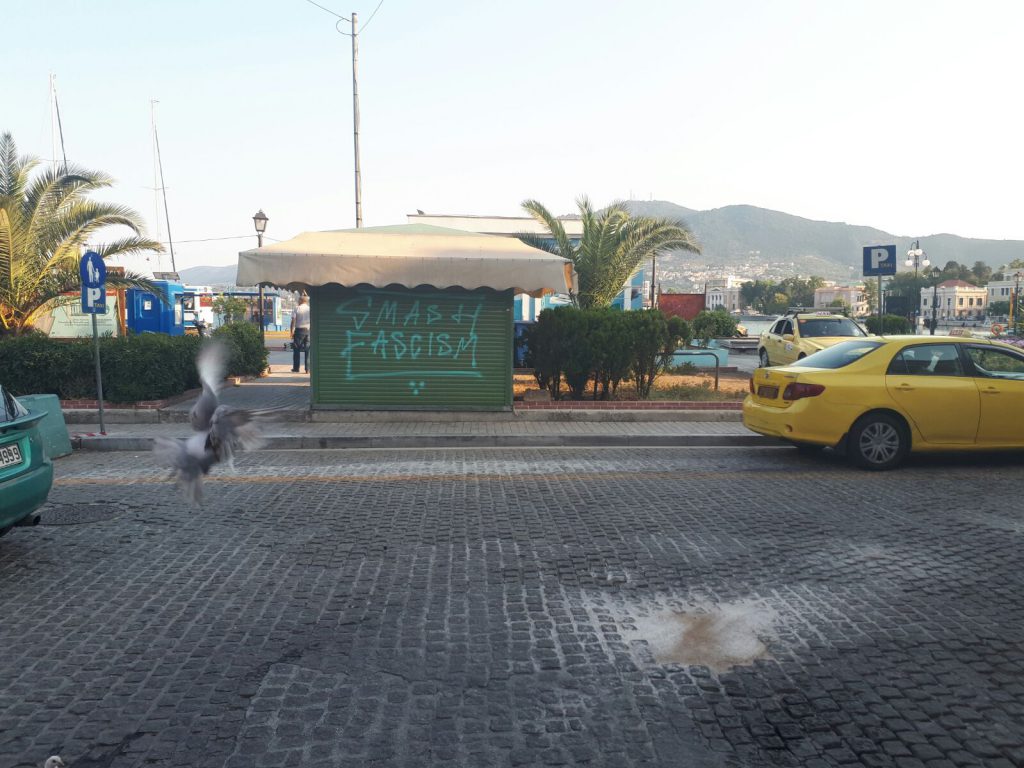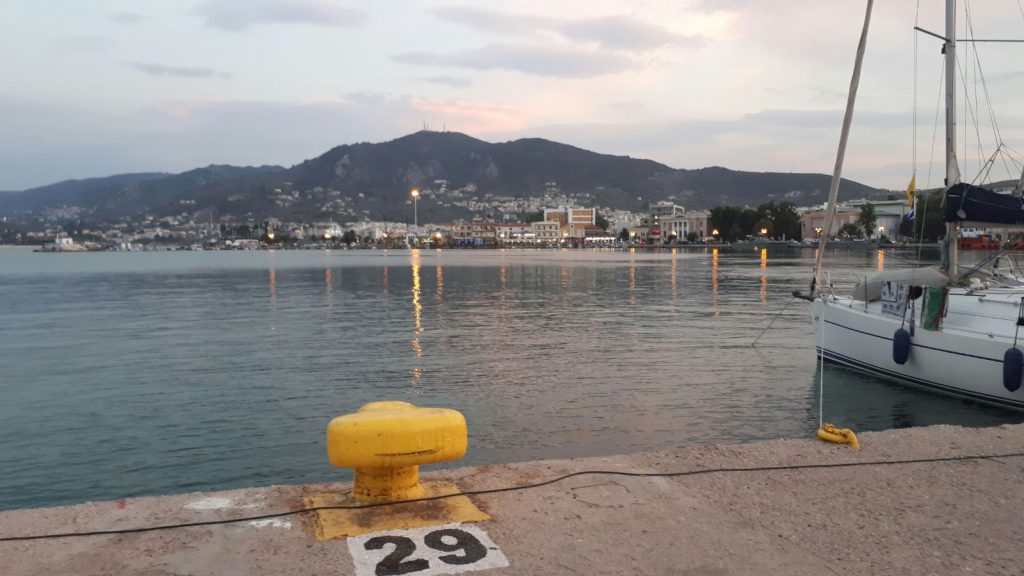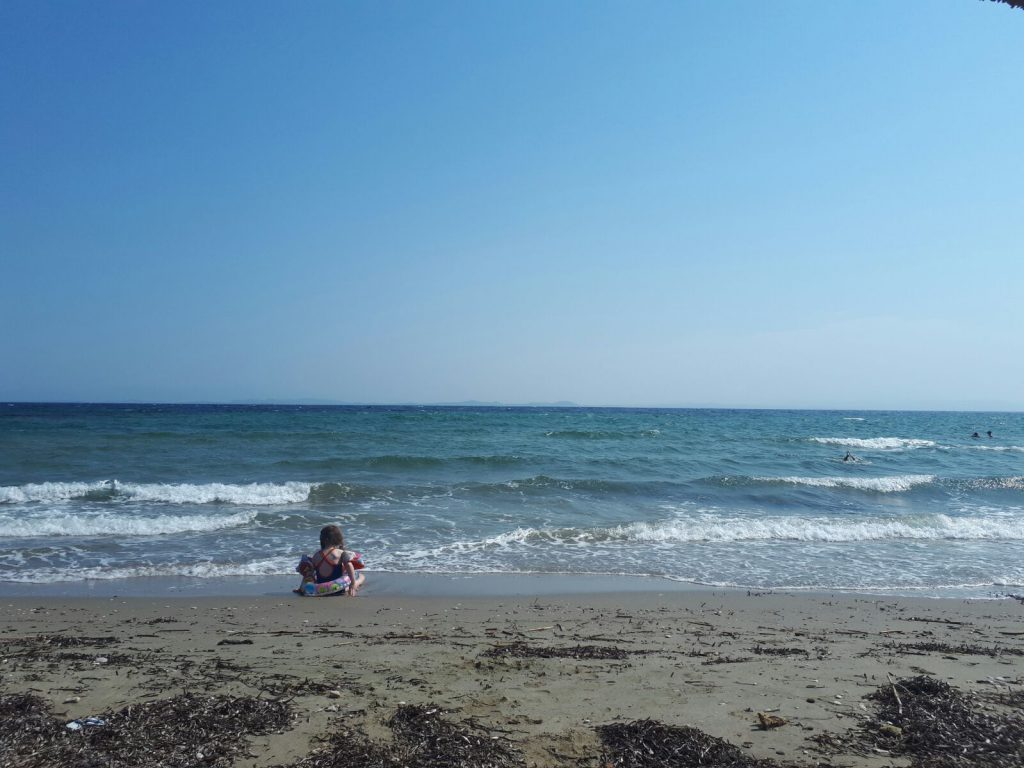During the month of August I volunteered with an organisation based on the island of Lesbos which gives legal advice to people seeking refugee status. Many refugees find their way to the island due to its proximity to mainland Turkey which you can see from the beach, about 8km from the western shore. What follows is a flavour of the many different issues faced by both refugees and islanders in coping with a crisis which is now being played out far away from the gaze of most of Europe.
Coming back from town one beautiful evening I saw the most horrific sight; a boy, a teenager at most, sprawled motionless on his back by the side of the road. His arms were stretched out as wide as they could with legs doing something similar. Two policemen stood over him directing traffic and a car was stopped in an unorthodox fashion about 15 to 20 metres away, a cracked windshield indicating the point where the boy had connected with the car. I can’t tell for certain where he was from, or even if he was a refugee at all, but he was laid out near the turn off to where refugees are ‘housed’ on the island by the village of Moria. Being close to the supermarket, it is not uncommon to see groups of people (usually men) at this point.
I remember myself as a teenager my pal’s mother joking that if we did not stop acting like we were, teenagers I suppose, that she would make us go play by the motorway. It seemed hilarious, abstract even. We were doing the usual – in bands, playing football, doing part-time jobs and going to school. But it did occur to me that if you are a refugee here, you are simply waiting. It is not unheard of that this waiting could last for up to a year before finding out whether you have been granted refugee status or not, so during the day there is little to do for teenagers but sit by the side of the road wasting time. Other boys your age zoom past after a fun day at the beach – swimming, flirting, playing games and driving close enough to you to glance your arm as you tripped perhaps. Your head smashes against the windscreen, then black.
I began to imagine the hardship and danger which was part of this child’s journey in getting here, to this island in the most mythical eastern tip of Europe home to the temple of Dionysus and the well of Achilles. I projected onto him the horrific stories of brutality and arbitrary human cruelty which have driven so many from Syria and Iraq. The reasons for leaving Syria are clear given the well documented accounts of murder, torture and imprisonment and it is this which spurs people to travel such a long way overland, paying smugglers as they go, to finally get the boat from Turkey to make the short journey to Lesbos. I have been told first hand that it’s a frightening final hurdle in the dark of night.
Will I sink or will I swim?
Are we not packed too tightly in this small vessel?
On arrival travellers are processed and housed in the main refugee camp in Lesbos, near the village of Moria where they may remain as refugee applicants. It is here that they wait for the interview where the authorities hear the applicants’ stories. It must be decided whether the person is who they say they are, whether their narrative is consistent and whether it tallies with what is known of the situation in the country from which they hail. Secondly, it must be established, based on this whether what the person claims is grounds for refugee status. It reads straightforwardly in print but the reality is a cruel and daunting process for those who most need it.
What spurred his journey; imprisonment, death, a bomb, a rape?
I have in my work as a lawyer seen the damage that a severe trauma may have on the memory of a person. The ability to recount may be stunted and any understanding of what is normal confused. Where there has been childhood abuse, sexual or otherwise, the trauma manifests in many ways and may be masked by the abused and hidden even from themselves. A clear and recent example of this was explored in the Netflix documentary series The Keepers.
While the series relates to the city of Baltimore, having grown up in Ireland over the past thirty years many of the facts are numbingly familiar. The story revolves around the sexual abuse of pupils in schools run by the Catholic church. What is of note in this context is the effect of the abuse on the main subject of the series, Jane Doe, who hid much of this trauma for decades as a protective mechanism.
I can’t help but think of my young pal laid out on the side of the road, and how his recent accident may hinder his ability to recollect. But regardless of any injuries sustained on the island, the ability to process all that has happened and give a full account of this to complete strangers in a formal interview is a tall task for the most damaged of refugees. Yet this is what we ask of them.
Living in Lesbos
Having brought our two young children on this trip, it has been imperative to make sure that the 4/5 hours where the sun is at its strongest are enjoyed in the shade. I have personally found that not to do so brings on only frustration and arguments as the heat is conducive to little else. This routine was aped from the locals as I noted early on that not much gets done from just before midday. If you go into town near 7am you see people scuttling around prior to the onslaught of heat and as the evening meets the night the bars and restaurants by the pier become packed. We do all of our own hiding from the sun on our terrace in the shade or in our air-conditioned apartment without which I, with my Irish constitution, would melt, faint and/or explode.
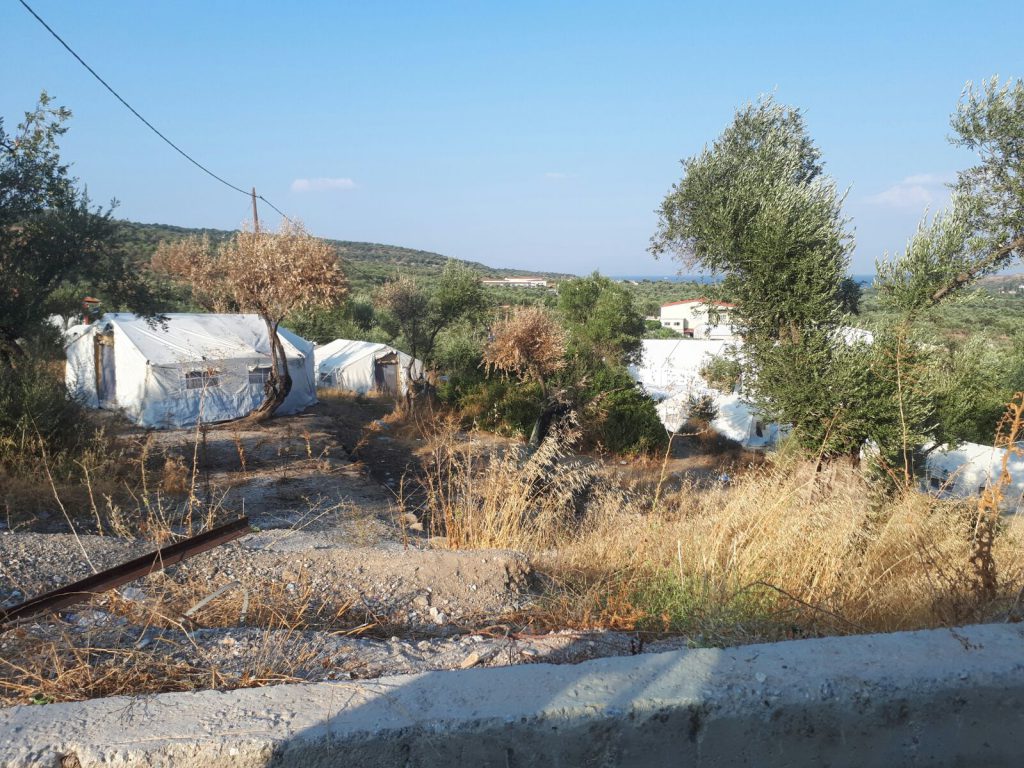
However, the contrast with the camp that asylum seekers stay in at Moria is stark. People are housed in prefab units high on the side of a hill in the full glare of the sun, strangers sleeping side by side with nothing as extravagant as air conditioning. As well as this there is nothing to do. No-one who has experienced the camp has anything good to say about the place. I just cannot imagine being there with a young family, after having experienced torture. I can’t see how it could not only make things worse.
Was this the point of all the pain and danger for the refugees? It’s all quite symbolic really, to be spread–eagled on the side of the road with the local authorities standing over you directing traffic. These policemen represent the Greek state and by association the EU, which is keeping you on this Island. They control everything. And why here? Mythical Lesbos, home of the temple of Dionysus and the well of Achilles. Part of an ancient nation which forms the basis of so much of what we regard our modern free world.
Aside from this, if you travel the island you can see some beautiful signs of friendship. All around there are badly graffiti-ed, yet large signs stating ‘refugees welcome’, ‘end all borders’ and the like. There is an amazing restaurant called ‘Home’ where owners Nikos and Katerina organise for people from the camp to come and be served a meal. I can personally attest that it is beautiful food. The broader idea is to give people a taste of the reality that they may once have known, that they be served in order remind them of their humanity and true place in this world. It makes for a wonderful atmosphere as the different elements meet.
I distinctly remember a pair of old Greek brothers chuckling away at the guff that my young daughter and a young refugee child from the camp had mustered. What struck me most was the absence of a common language between all four, yet they were interacting and laughing away with this as a minor consideration.
Out of sight, out of mind
It is not a complex lifestyle that many islanders appear to lead, to this untrained eye it is typically Mediterranean. There is an ageing feel to the population outside of Mitylini, the main town: olive groves dominate much of the middle and south of the island and on the coasts there are beautiful beaches. It is not a rich place and in the countryside it is not unusual to pass cars that in Dublin would easily be deemed ‘vintage’, in particular there is a class of Japanese-made farmers van which is omnipresent that I can conservatively date to the 1980’s, but may be much older. My own hosts run a simple apartment complex out of town: figs, grapes and pears grow in the garden with the clearest and calmest of blue seas a minute’s walk away. It would appear that every village has at least one small bakery where you get the most amazing bread and treats. Alongside you may find a small supermarket where you can buy the basics i.e. feta by the bucket load along with whatever vegetables at the time are fresh.
However, the presence of immigrants does put some strain on the locals and not all are as happy to see the changing landscape of the island. Its attractiveness as a tourist destination to some is lessened and it is easy to forget the economic pounding that Greece took only a few years back. This in turn unleashed a political turmoil into which sprang the fascist group Golden Dawn who lest we forget attained a not unsubstantial cut of the vote. I recall one conversation that I had using a mixture of Greek, English and German, which I felt told a lot of the islanders’ quandary. It began with the dreaded, “I am no racist” and a missive about the refugees, but quickly moved on to a rant which referenced largely the EU and the capitalist system, both of which are deemed to have been unfairly rough on this proud old nation.
That refugees are now kept here, their first port of call, would appear to be a sop to the rising far right all across Europe where in Germany, Holland, France and the UK the polls had been rocked. So much of this right-wing vote was fuelled by the great movement of refugees into Western Europe, especially to Germany. In response, ‘out-of-sight out-of-mind’ it would appear is now the policy, and sleepy Lesbos fits this perfectly.
As I write this, what frustrates me most is how petty it would all seem to be. Refugees stand out on this island and you can come across them wherever you go. I’ll never forget one evening teens jumping straight out of the sea and trying to make my baby laugh. The only girl in the party, while not wearing a veil, was covered head to toe in her now sopping clothes. The warmth of their smiles and a thin boy whispering “inshallah beautiful” to my child will never leave me.
At another point, myself and my family had the pleasure of being put up by a couple of Kurdish lads for a night after we were locked out of our own apartment. They now live in Europe but had previously arrived on a boat to Lesbos and had stayed in the Moria camp. The purpose of their return was to volunteer as interpreters for current refugees. It was impressive to hear each, in perfect English, listing off the five or six languages they spoke fluently. I explained quite sheepishly the importance of the cúpla focail et un peut de français which I held. I had originally placed them as French given the twang to their English and the slick haircuts (my age is really showing here).
We had never met before, however, after 20 minutes of hearing our situation had no qualms in offering us anything we needed, and within days we were having our dinner cooked for us whether we wanted it or not. No trick, no snag, just a common warmth and decency of a type that puts me to shame. This of course, is the real tragedy which is at play. That in the rush to save ourselves from the ISIS bogeyman that dominates so much of the current news agenda, it is consistently overlooked that the people arriving on boats are fleeing this terror too.
The complex mythology and simple beauty of Lesbos means there will always be something magical about the island, but for the moment its function is to bear Europe’s burden. For the refugees that find their way here, there is little to do but hang around and seek out ways to hide from that pounding sun. Maybe even by the side of the road.
- Photos: All photos © Eoin Cannon (August 2017), Lesvos, Greece.

